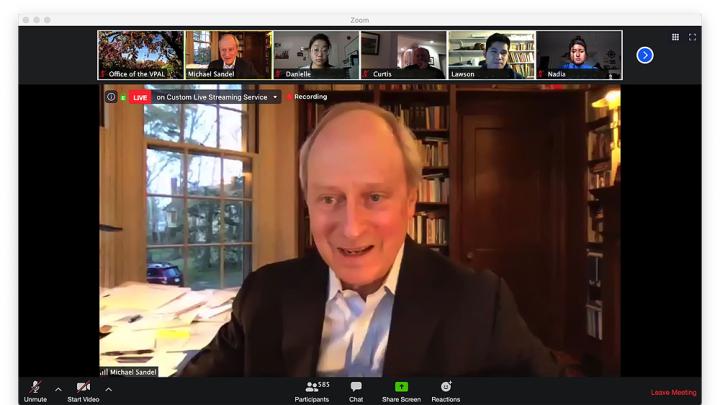Hundreds of listeners tuned in Thursday evening for an online Harvard-community discussion, led by Bass professor of government Michael Sandel, on the ethical, social, and political questions provoked by the coronavirus pandemic. Is it morally OK to avoid risk of exposure by hiring someone to go grocery shopping for you? Or to pay human subjects to test out a promising but unproven vaccine? What about the idea of giving “immunity passports” to those who test as having recovered from the virus, allowing them to return to work and to their wages, while others must stay home? Where is the right place to draw the line between preserving lives and preserving the economy?
There were no easy answers.
Acting as a kind of amiable and engaging dinner-party host, Sandel spun what-ifs and hypotheticals out to his video-chat audience, asking them to vote in favor or against, and then called on individual participants to argue their moral case. More than 500 listeners tuned in on Zoom—including Harvard president Lawrence S. Bacow and his wife, Adele Fleet Bacow, both recently recovered from coronavirus—and other listeners connected through YouTube. The audience ranged across the University: undergraduates, Arts and Sciences members and Kennedy School professors, students from the Medical School, the Business School, the Law School. (The event was organized by the Office of the Vice Provost for Advances in Learning, which oversees HarvardX and other University online activities.)
Early in the hourlong discussion, Sandel posed a question with a specific Harvard angle, which a faculty member had submitted beforehand: would it be ethical to require students to submit to daily virus testing as a precondition for returning to campus? “There are lots of preconditions to coming to the school,” said one Harvard Business School student. “We have to have certain vaccines and pass other health tests. And so, if this is something that really endangers the community…then there should be no problem in doing this.”
A student from the Graduate School of Design wasn’t so sure. “People with preexisting health conditions would be more likely to not be immune or not to pass the test,” she said. “So, you're advantaging the people who are already very healthy and strong, and younger.”
Issues of equity, autonomy, privacy, assumed risk, and informed consent came up often. So did the tension between practicality and ethics, between benefits to society versus individuals. Sandel raised a comparison that’s been debated widely in recent weeks—between the nearly 40,000 Americans who die annually in car crashes, and the projected death toll from COVID-19. If the United States could reopen large parts of the economy at an annual cost of 40,000 deaths from the virus, he asked, would it be right to do so?
The audience vote for that one was fairly evenly split, and the answers participants gave were deeply ambivalent. One College student pointed out that driving a car implies a level of autonomy and responsibility that catching an illness does not. A medical student said she found the question troubling: on one hand, she was inclined to place human life above all other considerations. And yet: “The economic consequences of shutting down society are that quite literally millions of people are going to be pushed into poverty. And that in itself entails a lot of both economic and health-related outcomes which may not be so desirable for society.…I have no have no easy answer for this, unfortunately.”
Another student in the medical school put a finer point on it: “I can't catch anything from anybody in a motor-vehicle accident. I can certainly catch a virus from treating somebody with COVID.”
As the discussion wound to a close, Sandel gave the Bacows the final word. Adele Fleet Bacow noted the audience’s range and diversity: “It just reinforces how important it is to have a multidisciplinary approach to think about ethics, to think about science, to think about policies, to help us get through this pandemic.” Lawrence Bacow acknowledged the thorny contradictions in every conundrum the group had discussed. “We live in an imperfect world,” he said. “I think we would all acknowledge that almost everyone who commented tonight said we would like the world to be better. And I think that is our responsibility collectively to try and make it better. But I'm struck by how all of the choices that we seem to face in dealing with this particular problem are bad choices. None are obvious. None is clearly the right thing to do. But act we must. We don't have the luxury of just saying the problem is too hard. So we will deal with it. We'll struggle with it. We'll try and make the best choices that we can.”








